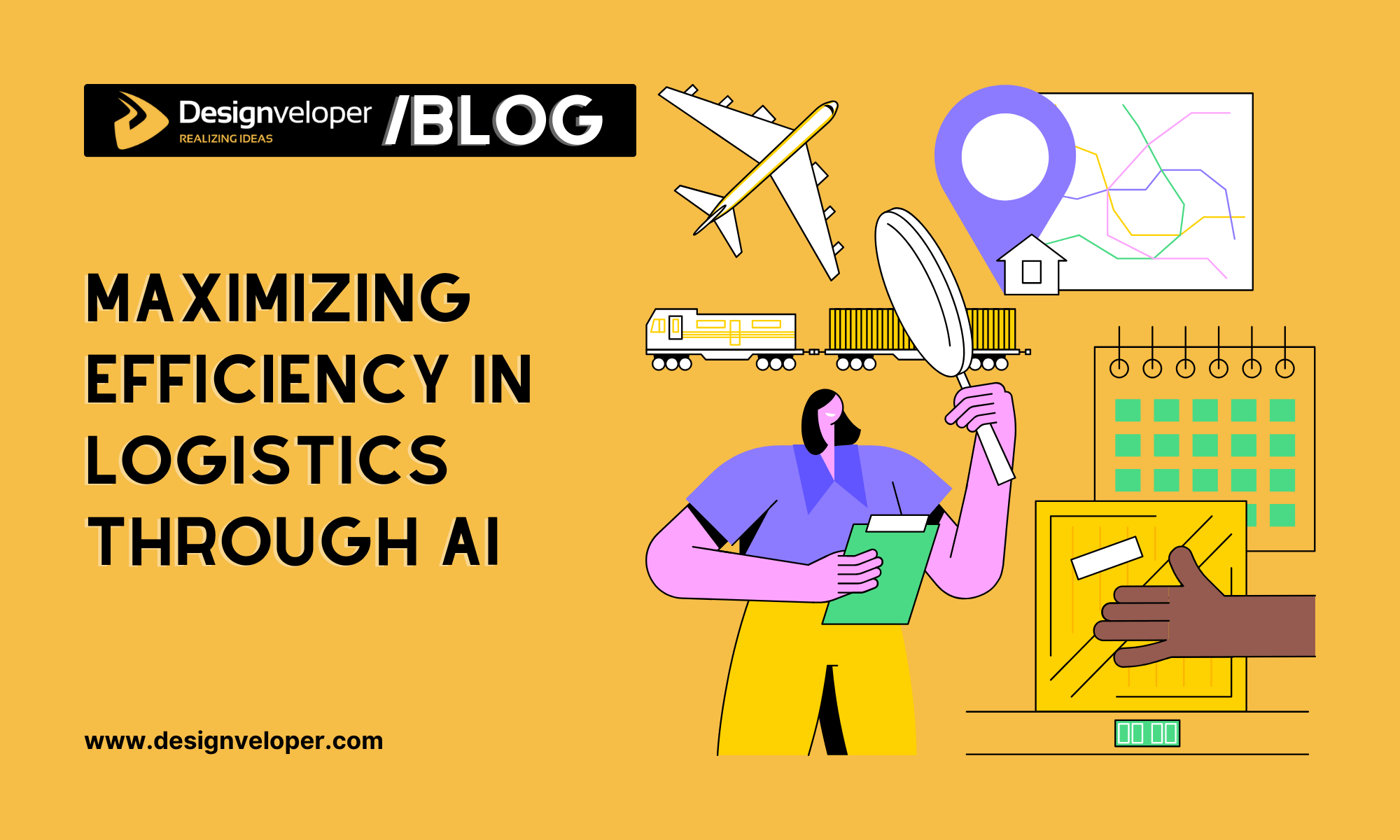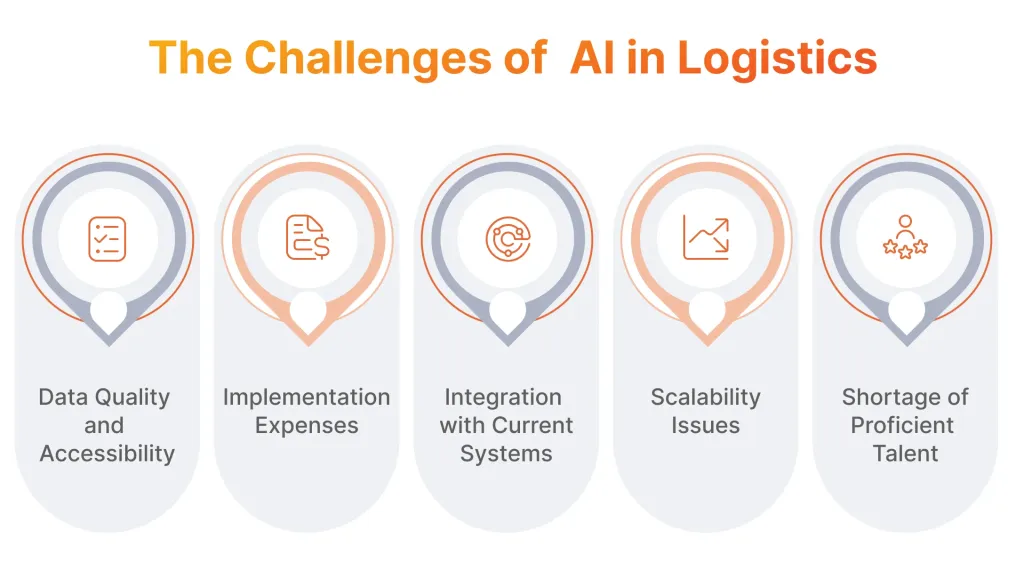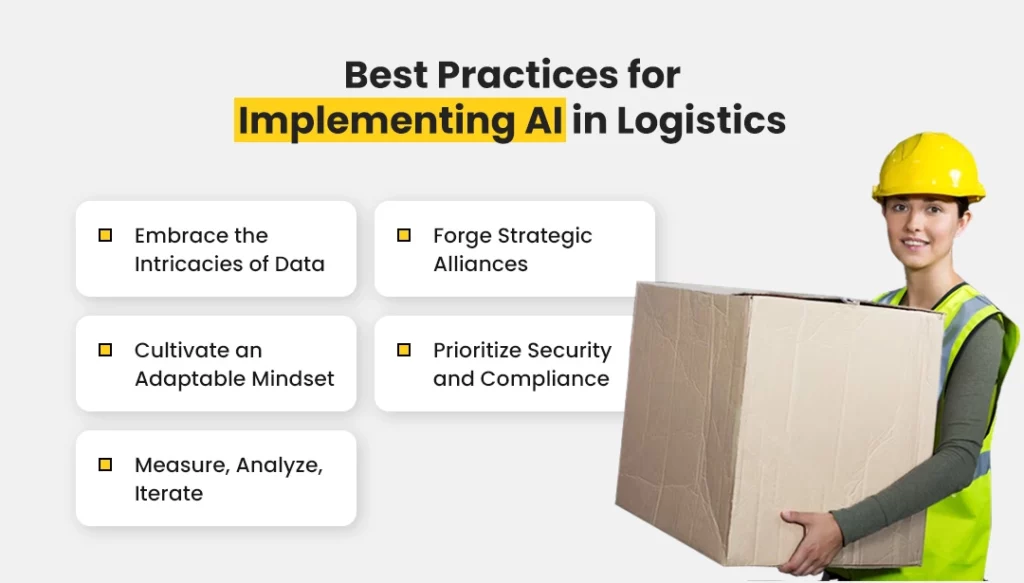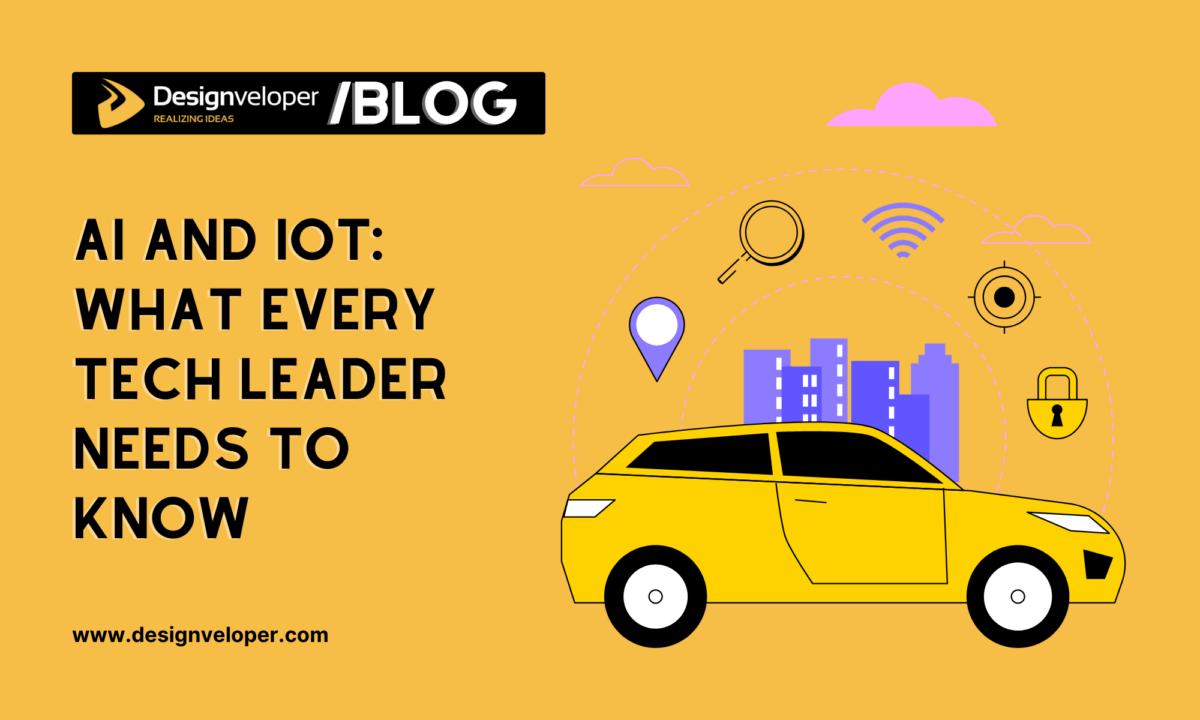Maximizing Efficiency in Logistics through AI: Opportunities, Challenges, and Best Practices
October 31, 2024


The logistics industry is experiencing a profound shift as artificial intelligence (AI) redefines efficiency, responsiveness, and adaptability in ways previously unimaginable. Today, AI serves as a linchpin in logistics, addressing challenges like supply-demand unpredictability, volatile transportation costs, and the pressure for faster deliveries. Unlike traditional software solutions, AI brings predictive and adaptive capabilities that significantly enhance decision-making across the supply chain. In an environment where even minor delays or stockouts can lead to significant disruptions, the ability of AI to process and learn from vast data points empowers logistics firms to operate proactively.
AI-driven tools in logistics do more than automate; they empower companies with real-time insights and predictive analytics that allow for hyper-accurate demand forecasting, optimized routing, and intelligent inventory management. These tools foster a more responsive logistics framework, which is essential as global commerce continues to surge and customer expectations for rapid delivery intensify. By leveraging advanced machine learning algorithms, AI in logistics has unlocked opportunities to foresee bottlenecks, anticipate demand shifts, and manage resources in ways that significantly reduce waste and costs.

In this article, we explore the multitude of ways AI is redefining logistics, from revolutionary benefits to often-overlooked challenges and actionable best practices. By understanding and harnessing these advancements, logistics companies can transform operational efficiency, positioning themselves to meet rising demands effectively and profitably.
Recommended reading: 10 AI Data Analytics Tools Transforming the Industry in 2024
AI Opportunities in Logistics: Driving Efficiency and Innovation
AI enhances efficiency and innovation in logistics, turning complex challenges into manageable, profitable processes for companies. In the face of fluctuating demand and mounting expectations for timely delivery, AI-driven solutions are particularly valuable for streamlining operations. AI-driven predictive analytics helps firms anticipate demand, manage inventory better, and avoid excess stock and costly shortages. This predictive capability not only improves customer satisfaction but also optimizes resource allocation.
Predictive Analytics for Demand and Inventory Management
Predictive analytics is a cornerstone of AI’s impact on logistics, particularly in demand forecasting and inventory management. AI analyzes historical data and market trends, allowing logistics teams to adjust inventory dynamically based on anticipated demand. This level of accuracy minimizes holding costs and ensures stock readiness.
Optimizing Routes and Fleet Management with AI Algorithms
AI’s role in route optimization cannot be overstated. Advanced AI algorithms analyze traffic patterns, weather conditions, and historical data to suggest the most efficient routes for delivery. This leads to lower fuel costs, fewer delays, and better fleet utilization as e-commerce and last-mile delivery demands grow.
AI-Driven Automation for Warehouse and Order Processing
Automation in warehousing is another area where AI shines, expediting order processing and inventory tracking. AI-driven robotics and intelligent sorting systems work in tandem to enhance accuracy and speed, helping companies manage high-volume orders efficiently. By integrating AI-driven automation, companies can achieve a streamlined warehouse workflow that reduces human error, improves order accuracy, and accelerates the delivery process.
FURTHER READING: |
1. What is Voice Technology? Definition and Examples |
2. 5 Common Myths of Artificial Intelligence |
3. What Is Artificial Intelligence? Definition, Types, and How It Work |
Challenges in Implementing AI in Logistics

While AI offers substantial benefits to logistics, the journey to full-scale adoption is fraught with challenges that are often underestimated. Beyond the initial investment, companies must address significant operational and technological hurdles, from data privacy concerns to complex integration processes with existing legacy systems. A comprehensive understanding of these challenges can help logistics firms develop strategies to implement AI effectively and sustainably.
Financial and Operational Costs of AI Deployment
AI deployment comes with high upfront costs related to software acquisition, hardware upgrades, and personnel training. Even after implementation, ongoing costs can accumulate, given the need for regular system updates and specialized technical support. For logistics companies, assessing these expenses against long-term returns on investment is essential to develop a financially viable AI adoption plan.
Data Privacy and Security Concerns in AI-driven Logistics
AI systems often process vast quantities of sensitive logistics and customer data, raising concerns around data privacy and security. Ensuring compliance with data protection regulations while maintaining the AI system’s effectiveness is a delicate balance. Companies must prioritize data encryption and stringent access controls to protect proprietary and customer information from breaches.
Integration Challenges with Legacy Systems
Many logistics companies still rely on legacy systems that are incompatible with modern AI solutions. Integrating AI into these systems can disrupt workflows and necessitate costly system overhauls. Logistics firms should adopt a phased approach to integration, starting with modular AI solutions that can operate alongside legacy systems without disrupting core functions.
| Challenge | Impact on AI Adoption | Suggested Solution |
|---|---|---|
| High Deployment Costs | Financial strain, delays in ROI | Prioritize high-impact, scalable AI apps |
| Data Privacy and Security Concerns | Risk of data breaches, regulatory fines | Strengthen data encryption, compliance |
| Legacy System Integration | Workflow disruption, increased implementation complexity | Use modular AI systems, phase integration |
Best Practices for Leveraging AI in Logistics

To capitalize on AI’s potential, logistics firms need strategic best practices that align technology with core business objectives and promote scalable, efficient AI integration. These practices encompass setting clear goals, fostering a data-driven culture, and designing a robust AI infrastructure that can support future innovations.
Aligning AI Goals with Business Objectives
Aligning AI objectives with broader logistics goals ensures that every AI initiative contributes to the company’s operational efficiency. By identifying specific areas where AI can add value—whether in demand forecasting or route optimization—companies can maximize AI’s impact on their bottom line.
Building a Scalable AI Infrastructure
A scalable AI infrastructure is crucial to adapt to changing business needs and advances in technology. Logistics firms should prioritize cloud-based solutions that provide the flexibility to expand or contract resources as necessary. Additionally, a scalable infrastructure reduces the need for costly overhauls when implementing future AI tools.
Fostering a Data-Driven Culture for AI Success
Creating a data-driven culture is essential for AI initiatives to thrive. This involves training teams to interpret and act on AI insights, fostering collaboration between technical and operational teams, and promoting a mindset of continuous improvement. By building this culture, logistics firms can ensure that AI’s potential for optimization is fully realized.
Case Studies: Success Stories of AI in Logistics
Real-world examples highlight how logistics firms are effectively using AI to transform their operations and drive efficiency gains. Each case study provides insights into overcoming specific challenges and applying AI strategically within different areas of logistics.
Case Study 1: AI in Inventory Optimization
Company A leveraged AI-powered predictive analytics to streamline inventory management, reducing stockouts by 30% and cutting carrying costs. By implementing real-time data monitoring, they could react instantly to demand changes, maintaining optimal stock levels and improving customer satisfaction.
Case Study 2: Route Optimization for Cost Savings
Company B employed an AI-based routing system that analyzed traffic, weather, and delivery windows to optimize routes. This initiative led to a 15% reduction in fuel costs and enhanced delivery speed, enabling the company to handle increased order volumes effectively.
Case Study 3: Warehouse Automation and Efficiency Gains
Company C integrated AI-driven robotics and automation in their warehousing operations, reducing order processing time by 40%. This change allowed the firm to accommodate peak season demand with minimal staffing increases, showcasing AI’s potential to create scalable, adaptable logistics operations.
For more details on the advancing role of AI in logistics, see Trinetix.
The Future of AI in Logistics: Trends and Innovations to Watch
The logistics sector is ripe for further AI-driven innovations that promise to reshape operational efficiency and resilience. Emerging trends, such as autonomous delivery vehicles and AI-powered risk management systems, suggest a future where logistics is both proactive and predictive. Autonomous delivery robots, already in pilot stages, have the potential to redefine last-mile delivery, reducing human intervention while ensuring timely, accurate deliveries.
Additionally, AI-based risk management tools are increasingly capable of assessing supply chain vulnerabilities, allowing companies to preemptively address disruptions. As AI in logistics continues to advance, its ability to create a hyper-responsive, efficient supply chain could make it the backbone of next-generation logistics solutions.
Unlocking Logistics Efficiency with AI
AI holds the key to unlocking new efficiencies, offering capabilities that align with the evolving demands of today’s global supply chain. By understanding and addressing both the opportunities and challenges associated with AI, logistics firms can build resilient, adaptive operations. As AI technologies continue to evolve, companies that strategically integrate AI into their logistics operations will be well-positioned to thrive in a fast-paced, competitive landscape. Embracing AI is not just a technological shift—it’s a pathway to sustainable, long-term growth in logistics.






Read more topics




























































